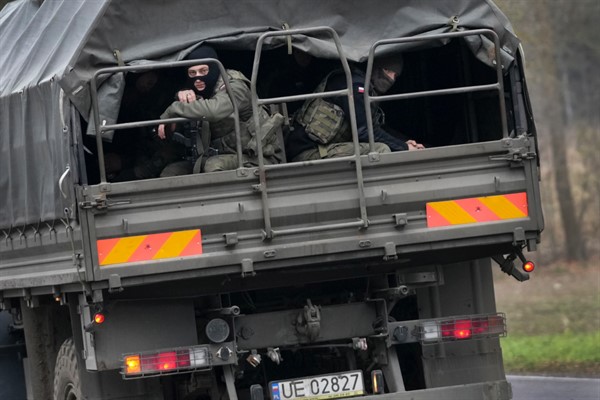There is cautious optimism in Brussels that the temperature seems to be dialing down on the crises with Belarus and Russia on the EU’s eastern border, as Minsk takes a step back in its long-running border standoff with Warsaw and Moscow has not yet made any military incursion into Ukraine, despite once again massing troops on the border. But there is also a feeling in Brussels and across the continent that the events of the past few weeks are a harbinger of dark days ahead.
EU defense ministers met Tuesday to discuss both the “hybrid warfare” by Belarus at the Polish border and the build-up of Russian troops at the Ukrainian border. They were joined by NATO Secretary-General Jens Stoltenberg, who warned Moscow not to take any “aggressive actions” against Ukraine. The French and German foreign ministers similarly warned of “serious consequences” for Russia if it invades Ukraine again. EU Commission President Ursula von der Leyen discussed the issue with U.S. President Joe Biden at the White House last week, with both stating that they “fully support the territorial integrity of Ukraine.” But that will be cold comfort to Kyiv, which watched the West sit idly by when Crimea was invaded and annexed by Russian forces in 2014, apart from issuing sanctions that have been unsuccessful in reversing the annexation.
In the days since von der Leyen’s meeting with Biden, the situation at the EU’s eastern border has calmed somewhat on both fronts, with no new migrant arrivals to Belarus and no new Russian troop movements. Facing the threat of sanctions, third-country airlines from Turkey, Lebanon and the UAE voluntarily agreed to stop one-way flights to Minsk for people from Syria, Iraq and Yemen. EU foreign affairs chief Josep Borrell and German Chancellor Angela Merkel have both been in direct contact with the Belarusian government; Belarus authorities have started moving migrants from the border to a logistics warehouse near the Kuznica checkpoint and from there possibly on to Minsk. Repatriation flights to Iraq are scheduled to start today, and Belavia—Belarus’ national airline—is voluntarily participating in the flights. That has caused some EU member states to consider holding off on applying sanctions against the airline for now, much to the great frustration of the bloc’s eastern member states.

